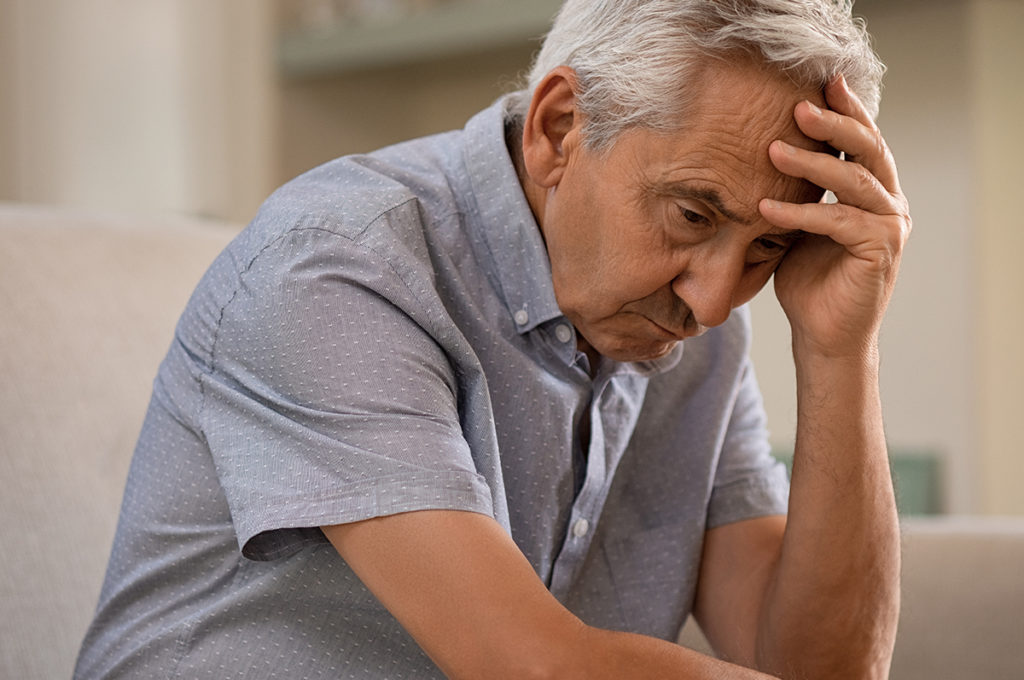Read the latest and greatest from our team
of incredible specialists.

Beach House Recovery Center » Blog » Can Depression Be Cured?
Receiving a depression diagnosis might feel like a weight has settled on your shoulders. The hopelessness that characterizes this mental illness can make it seem like you’ll feel this way forever, while your internal negativity might persuade you that you’ve never deserved happiness. However, neither of these are true. While there is no cure for depression, that doesn’t mean you will always feel the same way you do today.

Being depressed can be an ongoing struggle. You might experience periodic, isolated episodes of depression, or deal with prolonged periods where daily life feels like a hard-fought effort. It’s challenging to predict what your experience with depression will be. But odds are good that the more severely depressed you are and the longer you go without seeking help, the less likely it is that your mood disorder will go away on its own – and the more likely it will be to return.
Severe depression is more than a bad mood or a temporary bout of sadness. The more intense your symptoms are, the harder it will be for you to recover. If depression and other mood disorders run in your family, you may need medical intervention to find relief.
When health care professionals have discovered a cure for an illness, that means they have identified a remedy that eases the symptoms to an extent where they never return. Many illnesses are treatable, but not curable. For example, when someone has asthma, diabetes, a substance abuse disorder or Alzheimer’s, their disease is with them for life.
However, that doesn’t mean there is no hope. In the past, the prevailing philosophy was to solely address the symptoms, but now, most health professionals prefer to give their patients tools to manage their symptoms so they can live a longer, healthier life in recovery.
For example, successful depression treatments may include lifestyle changes, participation in group and individual counseling, dual-diagnosis programming and taking specific prescription medications. Since everyone is different, it may take some trial and error to find an approach that works for you.
Fortunately, like other mental illnesses, depression is treatable. Besides seeking professional help from a doctor or therapist, you can take independent steps to improve your mental health. Start by learning more about depression and what causes your symptoms to improve and worsen. Then, pick a strategy you feel you can reasonably maintain – like exercising more, working to quit any addictive substances you use or writing in a journal every day. Stick with the change consistently for a few weeks, and see if you feel better. If not, try something else.
Taking an active role in improving your mental health is more rewarding and productive than waiting around and hoping things will change by themselves. Plus, many proactive mental health strategies, including dual diagnosis treatment for individuals managing co-occurring conditions, make excellent habits to implement in your overall lifestyle, with benefits that go far beyond helping you keep your depression symptoms under control.
Depression can feel like a nearly insurmountable battle if you lack the support or security necessary to address the mental and physical symptoms so you can live a more fulfilling life. You can find both these qualities at an accredited dual-diagnosis treatment facility such as Beach House.
In many cases, substance use and mental illness go hand in hand, becoming so intertwined that it’s impossible to tell where one disorder ends and the other begins. People who drink or use drugs to temporarily escape from their depression symptoms will only make their mental and physical health problems worse in the long run. Simultaneously treating these issues provides the best chances of long-term success in recovery.
We offer evidence-based therapies for all types of co-occurring disorders, alongside our industry-leading client-to-therapist ratio. If you need clinical monitoring or medication-assisted treatment, you can benefit from these services while participating in counseling and 12-step recovery groups to facilitate your overall wellness.
With the right treatment regimen, it’s possible to manage your depression, end your reliance on alcohol or drugs and begin a new life. Contact us today to learn more about what our nationally recognized treatment program can do for you.
Whether you’re researching for yourself or a loved one, Beach House can help. We understand that this is a serious time in your life and that the treatment center you choose matters. We want you to feel comfortable and empowered to make the right decision for yourself, a friend, or a family member. This is why a counselor is waiting and available to answer your questions and help put your mind at ease regarding the next steps. Many of the staff at Beach House have walked in your shoes. If you feel you’re ready or want more information about how to help a loved one, we can help today. You can also learn why we are voted the #1 rehab for addiction treatment in Florida.
We accept most major insurance plans and can verify your benefits quickly and confidentially.
We’re committed to helping you access the care you need, our admissions counselors can guide you through your coverage options and available resources.





"*" indicates required fields